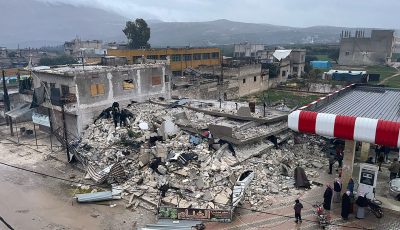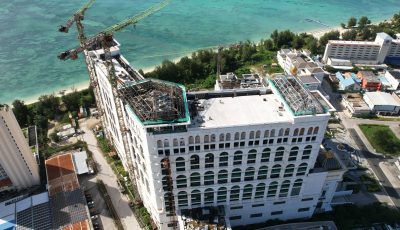IN LAWSUIT OVER APPROPRIATION OF $400K FOR M/V LUTA
Lt. Gov. Hocog claims legislative immunity
But DelRosario says $400K ‘gift’ to family not protected by legislative immunity
Lt. Gov. Victor B. Hocog has claimed that he is entitled to legislative immunity and therefore the Superior Court should dismiss the lawsuit filed against him and Department of Finance Secretary Larrisa Larson by former Department of Public Lands secretary John DelRosario over the transfer of $400,000 in government funds to Luta Mermaid LLC, that owns cargo ship M/V Luta.
But DelRosario, through counsel Jennifer Dockter, disagrees. Dockter said Hocog is not protected by legislative immunity for the acts he undertook without authority and which violated the law, his ethical obligations, and his duty to Commonwealth taxpayers.
In DelRosario’s opposition to Hocog’s motion to dismiss, Dockter said the Rota Legislative Delegation Resolution 19-03 attempting to “appropriate” money is not authorized function of the Senate and did not benefit a group of people equally, rather, it benefitted Hocog’s family.
Resolution 19-03 stated that Rota Legislative Delegation was authorizing the Finance secretary to make payment of not more than $400,000 to Luta Mermaid to pay for costs associated for the M/V Luta’s voyage from Louisiana to Rota. Then-Senate president Hocog introduced the resolution.
Then-assistant attorney general David Lochabay filed Hocog’s motion to dismiss. Lochabay passed away recently.
In Hocog’s motion, Lochabay said to carry out its critical role in the balance of separation of powers, and to promote the public’s interest in having lawmakers who can freely debate and act on behalf of the people, legislative immunity broadly protects all acts carried out in the legislative sphere.
“Even if legislative acts are carried out with malicious intent or in violation of law, no matter—legislative immunity covers them too,” Lochabay said.
Lochabay said DelRosario’s causes of action in his lawsuit against Hocog are founded upon acts that occurred within the protected legislative sphere: attending a legislative session, introducing a resolution, and voting to adopt a resolution.
“These are clearly, and indisputably, legislative acts protected by immunity,” he pointed out.
Lochabay said Hocog’s complained-of conduct—attending a legislative session, and introducing and voting upon a resolution—plainly falls within the legitimate legislative sphere, and so is protected by legislative immunity.
Lochabay said the allegations that these legislative acts may have been carried out in violation of the Open Government Act or the Government Ethics Act does not destroy Hocog’s cloak of immunity, because “the claim of an unworthy purpose does not destroy the privilege.”
Lochabay said Hocog’s intent in carrying out the complained-of conduct is not at issue; nor, is whether he carried out the complained-of conduct in violation of some law at issue.
“What matters here is whether defendant Hocog’s conduct fell within the legitimate legislative sphere—it did,” he said.
In DelRosario’s opposition, Dockter said the issue is whether Hocog has met his burden of showing that his acts which are not authorized by the NMI Constitution—and which violated the government ethics code, violated his fiduciary duties, and improperly spent public funds—are protected activities under the legislative immunity provisions of the NMI Constitution which makes him immune in his official capacity and in his personal capacity.
Dockter cited two reasons that Hocog has not met his burden.
First, the lawyer said, the acts were ad hoc decision-making, which benefitted only a few, and was not the formulation of policy.
Second, she said, regarding Hocog’s liability under the Open Government Act, the provisions of the OGA abrogate legislative immunity.
In any event, Dockter said, the acts which violate the OGA are also not “legislative activity.”
Dockter said the action involved one private company owned by Hocog’s family not the entire community or multiple private companies.
She said the public at large did not benefit, rather, Luta Mermaid LLC—a privately owned company—was simply given $400,000 with no obligation to spend the money for the community, to account for the spending of such money, or to repay the money.
“It was essentially a gift orchestrated by defendant which resulted in a benefit to his own family. This, it was an ad hoc decision, and it benefitted few,” Dockter said.
The lawyer pointed out that just because the act taken is a “vote” does not automatically make the act legislative for purposes of a legislative immunity claim.
Dockter said voting is not enough because Hocog voted not on public policy, not on a law that affects the entire community, but rather he merely acted to give his family $400,000 of public monies.
Dockter said the appropriation of money to a private company owned by Hocog’s family via a resolution was no more a legislative act by the Senate than handing down a sentence of incarceration to a convicted person would have been.



























